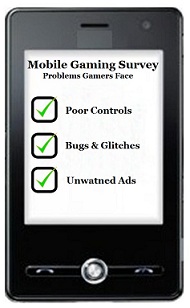 Survey highlights the issues that gamers have with mobile gaming
Survey highlights the issues that gamers have with mobile gaming
Mobile gaming has become a fun and important pastime for a wide variety of consumers all over the world. Like other consumers, gamers are a very picky bunch, and anything they perceive as a significant challenge to their gaming experience could have major consequences for mobile gaming. A new survey from Ebuyer, an e-commerce retailer based in the United Kingdom, highlights the challenges that face mobile gaming, and what gamers consider to be one of the most significant problems with most of today’s popular mobile games.
Poor controls cause irritation for gamers
According to the Ebuyer survey poor controls are one of the most problematic issue facing mobile gaming today. Given that the vast majority of these games are developed with a touch screen in mind, creating a control interface that can be both accurate and effective has been a serious challenge for nearly all developers of mobile games. Touch screens are not designed specifically for games, thus have limited functionality when it comes to gaming. According to the survey, 23% of gamers said that controls were often so irritating that they refused to play mobile games.
Micro-transactions and bugs are also a top issue
Controls are not the only problems gamers have with the mobile space, of course. The survey shows that 20% of gamers claim that micro-transactions are problematic in some regard. These gamers suggest that micro-transactions are either completely unjustified or that they are too difficult to use. In some cases, a poorly implemented micro-transaction system has led gamers to spend significantly more money than they had initially intended because of their repeated efforts to get the system to work properly. Bugs and glitches were also a problem for gamers. Approximately 17% of the survey’s respondents claimed that bugs were irritating enough to stop them from playing games.
Advertising proves to be the most problematic issue
The chief issue that gamers have with the mobile gaming space, however, is in-game advertisements. More than 40% of the survey’s respondents claimed that these advertisements were a very problematic issue and that they would be willing to pay significant fees in order to not have to see these advertisements at all. While these problems represent aspects of mobile gaming that are well on their way to becoming infamous, finding solutions to these problems is likely to be a difficult task for developers.

 The British authority will enable smartphone and tablet funds transfers among all bank accounts.
The British authority will enable smartphone and tablet funds transfers among all bank accounts.